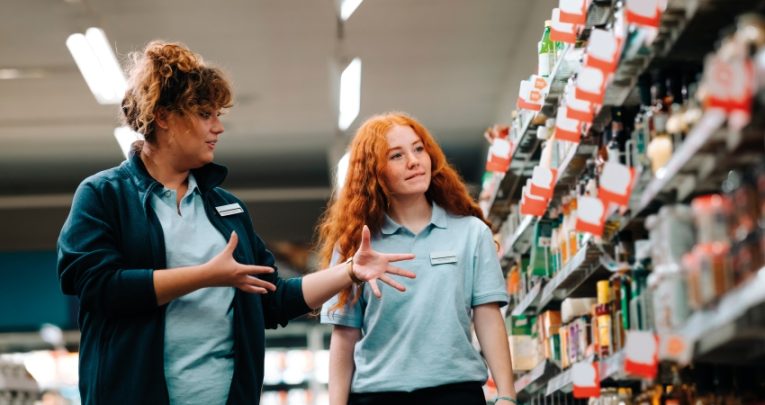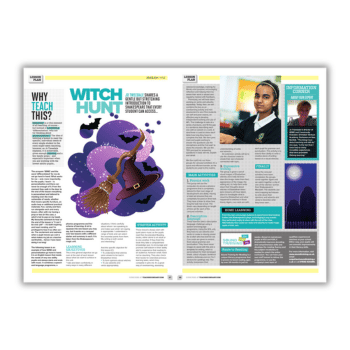Jobs for people with disabilities – Preparing for the real world

We meet the educators empowering students with SEND to achieve their job aspirations…

- by Teachwire

Jobs for people with disabilities can seem few and far between sometimes, but we meet the educators working hard to ensure that their students with SEND reach their career goals…
Preparing students for adulthood
Whole School SEND’s Amanda Wright explains why every school should have an effective ‘Preparation for Adulthood’ programme…
Learners in schools or colleges experience change every day. Some learners will need a great deal of support and preparation if they’re to effectively manage change. Even the smallest unexpected event can potentially derail them.
For the most part, however, they can complete small ‘micro’ changes – like transitions between teaching staff, moving to different locations around the school and switching between activities – without a great deal of upset. But what happens when we require larger ‘macro’ changes?
Macro changes will take place at various stages throughout a child’s education. They can include moves between year groups, phases and settings, and can be infinitely more stressful than any micro change. And while it’s the case that all learners will benefit from having a positive experience of such transitions, learners with disabilities and SEND will often find macro changes much more challenging to deal with than their peers, and hence require extra support.
Stage by stage
At each stage of this journey, educators should therefore provide learners with opportunities to develop the skills essential for the next. Of course, the ultimate ‘next stage’ will mean stepping into the world beyond the school gates, and completing the transition from school education into higher education or work.
Ensuring smooth transitions out of school is an essential part of preparing students for the demands of the professional world, and the many new experiences and expectations they will face.
Establishing a comprehensive Preparation for Adulthood (PfA) programme, which encourages consideration and conversations around work for all learners from the earliest years, is therefore essential. To be successful, however, you need to embed a PfA programme into the curriculum well before it becomes a requirement in Y9.
If they’re not planning to study at university, then once a young person has determined their chosen pathway – be it volunteering, an apprenticeship, traineeship or employment – you can develop more tailored strategies to reflect their specific needs.
Preparation tasks
It might be useful to try the below activities before learners with disabilities and SEND move to a work setting, so that you can help them enter the workplace with the skills, confidence, and adaptability they’ll need to be successful.
- Work with employers to create ‘transition packs’ containing information about how they structure their days, break and lunch arrangements, the workplace environment and their behavioural expectations
- Familiarise students with what their new travel arrangements will involve, including photos and maps
- Make prompt cards or checklists to help students remember new names and new routines more easily
- Organise additional visits to better familiarise the young person with the work environment and the people they’ll be working alongside
- Identify a named individual that young people and their families can contact for help in relation to their employment, if needed
- Work with external agencies to ensure the working environment will be safe and accessible, and that any specialist equipment the young person may need is in place
Empowering and enabling learners as they move towards life beyond the classroom is vital. How we deliver this support is one of the key themes we will explore through our Universal SEND Services Programme, which is funded by the DfE until 2025.
Amanda Wright is head of Whole School SEND, having joined in 2018 as a Regional SEND Leader; prior to this, she worked in mainstream education for 20 years and has extensive experience as a SENCo and senior leader.
Case study: Abbey School in Rotherham

Abbey School in Rotherham features a functioning street with a pet grooming room and its own branch of Asda, where students earn real credits…
Abbey School is part of Nexus Academy Trust, which is predominantly made up of special schools. We cover everything and anything to do with special needs – we have a hospital school, for example.
We teach a wide range of children aged five to 19, from those with the most complex needs, right up to those that could potentially have made it in mainstream if the environment and curriculum had been right, so it’s a real mix.
At the moment we have 211 children on roll across three sites, all with moderate learning difficulties – predominantly autism, but also children with social and emotional needs and PDA.
When I joined Abbey eight years ago, the school was in special measures and due for closure. When we achieved Outstanding three years ago, instead of feeling elation I remember feeling deflated. It sounds silly, but I was mindful of the fact that although we were giving children this wonderful educational experience, once they left us at age 19, the majority of them would end up sitting at home because there were no opportunities for employment.
Can you really be called Outstanding if your kids aren’t going to do anything after they’ve left you? It felt almost like offering children a trip to Disney World, then taking it away from them at the last minute.
Walking down STEAM Street
The world outside of school is harsh – it’s cruel. We’re passionate about getting these kids into employment, and the way we’ve done that is not by putting young people into mainstream experiences, but by bringing the mainstream into our world.
We pondered for a long time about setting up a play centre – similar to the ones where Foundation Stage children can go and play as a hairdresser, or pretend to be a pilot. I thought that if we could mimic that in school we could better prepare children for adulthood and employment, so off we went. We decided that the school’s specialist classrooms, which run right down the middle of the building, would all become related to employment.
STEAM Street, as we call it, features an actual road down the middle with lines on. It’s got traffic lights (to teach road safety to our youngest children) and there’s even traffic noise. We asked local companies to sponsor our specialist rooms, and a local restaurant agreed to sponsor our food technology room. The younger children would wear restaurant uniforms, and the older children would have work experience.
We’ve since started approaching larger businesses – our shop is sponsored by Asda, for example.
Breaking down barriers
In their annual review, students think about what they ultimately want to become and we work back from there. Every young person in school has a job – whether it’s sweeping the corridors, or being in charge of our school radio station. This breaks down barriers, especially for students whose parents have never worked. If that’s your experience, why on Earth would you think it’s great to have a job?
When the students are working in the shop, it feels like they’re really working at Asda – they wear the uniform, and all the branding is there. They get paid in Abbey credits to spend at the shop, so there’s a purpose to what they’re doing.
We want our young people to become familiar with that sense of belonging within a particular company.
A good example is one of our autistic students with moderate learning difficulties. Our street corridor is sponsored by a local refuge company so he was, in theory, working in school for them. He’d clean all the rubbish out, sweep the floors and clean up any messes. When he was older, he went on a placement work experience with the company, after which he actually gained full-time employment with them and is still working there now.
Another young man who had an internship with our IT team is now working for Amazon and drives a better car than I do! It’s about talent spotting – what can this young person really offer? – and then exploring that within the safety and security provided by school.
Purposeful education
On Friday afternoons we take part in the Duke of Edinburgh’s Award. As part of this, we have a real pet grooming service and a horticulture service, both related to real qualifications. Students have to apply for these jobs by going through an interview stage; they have to request time off; they get bonus pay. There’s also a finance team – students have bank accounts, and can apply for loans if they want to.
If you’ve got autism, find it hard to make sense of the world around you and haven’t made it in a mainstream environment because there’s too much to comprehend, then having the structure of knowing, ‘On a Friday afternoon I go and earn money at my job’, makes things much easier. They can translate their learning in school into an employment setting.
The kids here have a purpose for being educated; they know where they’re going. When I asked my 16-year-old, who goes to an Outstanding secondary school and does really well, what they were going to do, they didn’t have a clue.
That’s the difference. All of our students know what they want to become, and they know the stages to get there.
We’re making a difference in kids’ lives and boosting their self-esteem. When a young person who struggles with their speech and language hears themselves back on the radio, it motivates them to go to their speech therapy sessions, even if they don’t like them, because they desperately want to have a job on our radio station. It’s a behaviour incentive in lots of ways.
Jobs for people with disabilities
Also, just as in real life, if you don’t rock up to school, you don’t get paid. We try, wherever possible to mimic real life in order to prepare young people right from the word go.
Our entire curriculum is geared towards explaining to students that there are jobs for people with disabilities and they will have to get one – they don’t have a choice about that. Benefits aren’t an option for them. The only choice they have is what job they want to have. It’s about pushing expectations.
It’s great when shops and cinemas have things like quiet autism sessions, but that’s not the real world, is it? Kids need to learn to be in the real world. Unless we really challenge young people to think about the future and about their careers, then as teachers, we’re not really doing anything for them apart from temporarily occupying them.
Last year, 85% of our young people went into employment – either full-time employment or apprenticeships – with the rest going on to further education at college. If you look at the national statistics around young people with disabilities, about 6% of them end up in employment at the moment, so we must be doing something right.
Luci Windle (@luci_windle) is executive headteacher at Abbey School, part of Nexus Academy Trust; for more information, follow @AbbeyLearning










